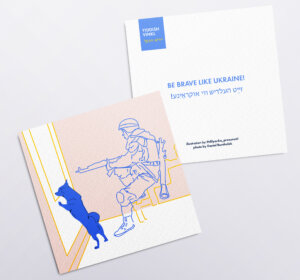Yiddish postcards from the war in Ukraine
A Ukrainian woman is producing postcards with slogans in Yiddish to raise money for first-aid kits.

Graphic by Angelie Zaslavsky
A postcard from Ukraine: A soldier, gun in hand pointed towards the window, sits on the stairs, his eyes scanning the area for threats. A dog is standing on its hind legs at the window, peering over the sill. The soldier appears as an outline, while the dog is colored deep blue.
This postcard is part of a set of three, all featuring man’s best friend. On the other side are patriotic slogans in Yiddish and English like “Zayt heldish vi Ukrayina” (“Be brave like Ukraine”) and “Shtey mit Ukrayina” (“Stand with Ukraine”). A third one has the words “Koved tsu Ukrayine, koved tsu heldn” which is probably meant to be a translation of the well-known phrase “Glory to Ukraine, glory to heroes”, even though the word “koved” usually means honor.

Beginning July 24, the cards will be available for purchase, with proceeds going directly to the purchase of military first-aid kits for soldiers and civilians.
These postcards are the brainchild of Helena Shot, a Ukrainian who founded a social media campaign called “Yiddish Vinkl” (Yiddish Corner) to raise the profile of the language. With the guidance of her Yiddish teacher Oksana Sikorska, she has posted vocabulary guides, interviews and information about her native city Lviv’s connection with Jewish history.
But when the war broke out, she left Lviv and went to the Netherlands, where she works at a tax-software company. At first Shot avoided posting anything, especially since so many others were already circulating horrific stories and photos. “Of course people can see every day different pictures of the bombed buildings, murdered people and raped girls,” she said in an interview. “For me I’d mentally had enough. I didn’t want to become just one more source that represents the horror of the war.”
That’s where the postcards came in. She wanted people to see Ukraine’s heroes, not just its victims. Those heroes include not only human beings but dogs, like those that help deactivate mines. Aside from their life-saving skills, dogs are dear to Shot. She has one back home. With the positive, heroic images on these postcards — including those brave canines — Shot hopes to inspire people, rather than horrify them.
Shot is also using the postcards as a way to support her fellow Ukrainians. She used money she’s been earning in the Netherlands to wire money to Ukraine for the printing, which is being done against all odds. She’s also paying a Ukrainian artist, Natalia Kapustynska to use photos of the war to create colorful sketches.
The ultimate goal is to contribute to the war effort by drawing in donations to fund first-aid kits, which she gives directly to a friend she trusts, a member of the aid organization, Brave Ukrainians. When she asked her friend what they needed, she named a few things but said that a first-aid kit was the best option, because it can be shared among people. “It’s more about peace than weapons,” Shot said.
Shot hopes that her stay in the Netherlands is temporary. “I really want to go home, I miss my dog and my family and my life in Lviv. I want this war to be over and of course I want our victory.”
She’d also like to resume her work with Yiddish. Shot’s journey to Yiddish began in 2018 when she saw a poster at Ukrainian Catholic University in Lviv and decided to take a class. Though she doesn’t have a Jewish background, she felt drawn to the language and culture; its remnants surrounded her in Lviv — or as the city is known in Yiddish, Lemberg.

“Lviv was very much Jewish and Polish — also Austrian and Ukrainian,” she said. “There are Jewish names on the facades of buildings. It was a part of the history of my city: to get to know more about the Ashkenazi, Galitzian Jews, I started studying Yiddish.”
Shot’s family history contributed to her interest. During World War II, her great-grandfather Fedir Pyvovarov notified Jews in the town of Bilopillia about advancing German raids, enabling the Jews to hide.
“Over time I had a strong sentiment to the language, and felt that I should contribute to preserve it, and to develop it in a more modern way,” she said. She came up with the idea for Yiddish Vinkl and shared it with her Yiddish teacher.
With posts in both Yiddish and English on Instagram, Facebook, Telegram, Patreon and Twitter, Shot passes along everything she learns about Yiddish and its place in Lviv. “I liked that it appeared on digital modern platforms; to spread the value of this language among modern people, I should use modern tools and platforms.” She also prepared colorful slides to teach grammar and vocabulary.
The postcards are an entirely new challenge, especially the logistics of exporting the printed products from Ukraine in wartime.
But to Shot, it’s all worthwhile, and not just because of her support of the war effort. She began to see that her hopes and fears for Ukraine and the Ukrainian language and culture had parallels with Yiddish. “Recently I’ve been thinking about my mission related to Yiddish even more, that what happened to it can happen to the Ukrainian language too if we don’t win.”
“I want a future for the Ukrainian language and the Yiddish language,” she added.






















